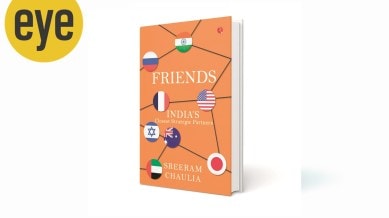Shubhajit Roy, Diplomatic Editor at The Indian Express, has been a journalist for more than 25 years now. Roy joined The Indian Express in October 2003 and has been reporting on foreign affairs for more than 17 years now. Based in Delhi, he has also led the National government and political bureau at The Indian Express in Delhi — a team of reporters who cover the national government and politics for the newspaper. He has got the Ramnath Goenka Journalism award for Excellence in Journalism ‘2016. He got this award for his coverage of the Holey Bakery attack in Dhaka and its aftermath. He also got the IIMCAA Award for the Journalist of the Year, 2022, (Jury’s special mention) for his coverage of the fall of Kabul in August 2021 — he was one of the few Indian journalists in Kabul and the only mainstream newspaper to have covered the Taliban’s capture of power in mid-August, 2021. ... Read More
‘Friends: India’s Closest Strategic Partners’ examines India’s relationships with its seven friends in a world full of turmoil
Sreeram Chaulia dedicates a chapter each to explain the evolution of India’s partnership with Japan, Australia, US, Russia, France, Israel and UAE

In a world full of turmoil, conflict and wars, countries need friends to navigate the geopolitical landscape. Prof Sreeram Chaulia, in his latest book, has listed India’s seven friends: Japan, Australia, US, Russia, France, Israel and UAE.
He has dedicated a chapter each to explain their evolution to becoming India’s friends. While his book is a bit short on history and delves more about the contemporary developments, he has captured the nuances of the relationships well. On some occasions, he comes up with thought-provoking ideas.
monthly limit of free stories.
with an Express account.
On Japan, he asks if India can also contribute more directly to Japan’s security in the East and South China Sea. He has astutely pointed out how India treated Australia as a “US stooge” and Australia used to consider India as an “undesirable strategic ally”. How the 9/11 and Bali 2002 bomb blasts brought them closer, but the Quad was still-born with Australia developing cold feet. He tells the story of incremental progress under several Australian PMs to the present day.
On US, his analysis is that prior to PM Narendra Modi, Indian leaders were wary about how far to go with the USA to check China. This is a contestable theory, especially considering the contribution of previous two Prime Ministers — Atal Bihari Vajpayee and Manmohan Singh. But, he raises an interesting proposition: if India might find it prudent to one day to distance itself from the US to secure concrete territorial concessions from China.
He documents Russia’s friendship towards India after the nuclear tests but puts forward a thought-provoking idea: Russia doesn’t also mind China-India conflict, given that defence manufacturing has thrived on sales of weapons to both India and China — its first and second biggest defence markets.
He points out how France respects India for what it is, rather than hectoring it with a hypocritical attitude of the liberal West on religious intolerance. The bilateral friendship, he argues, is focussed on national security — Indo-Pacific (code for China) and counter-terrorism (euphemism for Islamist fundamentalism).
Israel, he writes, has been on India’s side through the wars from 1962 to 1999. As victims of terrorism, he argues that India cannot afford a “Dahiya doctrine” — the disproportionate use of force against adversaries like Israel does — as it faces two nuclear-armed adversaries and lacks asymmetrical leverage.
UAE, he says, has helped India to deter China by agreeing to mid-air refuelling of France’s Rafael jets, which helped in its quick deployment on the India-China border.
The book is a useful primer for scholars, and also plants seeds for interesting contrarian ideas — for PhDs to delve into.
By Sreeram Chaulia
Rupa
304 pages; `795